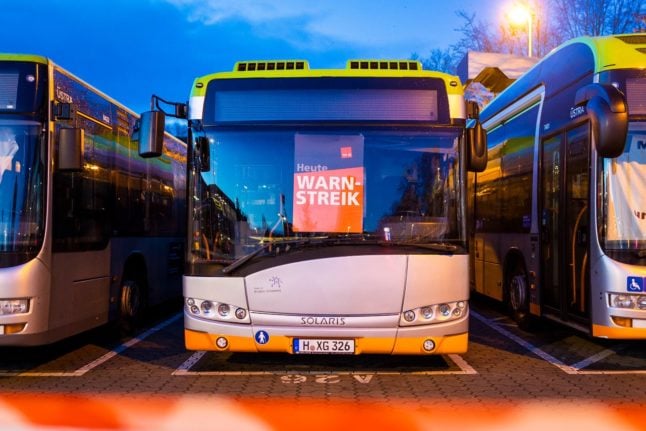How strikes in Hamburg are affecting flights and public services
With tough pay negotiations ongoing, there have been weeks of turbulence in the public sector – and on Thursday, Verdi’s warning strikes arrived in the Hanseatic capital.
Workers in public-sector jobs were called on strike by services union Verdi under the motto, “We are the city’s gold!” in order to push for double-digit wage increases.
According to media reports, bin collections, hospitals and the city’s opera house were all operating with limited capacity on Thursday, while most Kitas (daycare centres) were closed or running an emergency service only.
Strikes were also taking place at Hamburg’s main airport, with staff in border control, car park management and maintenance positions all staging a 24-hour walkout.
Advertisement
However, a spokesperson for the airport said operations were largely able to continue as normal as security checks, check-in and baggage and aircraft handling weren’t affected by the strike.
Kita closures
Some 200 Elbkinder Kitas in the city remained closed on Thursday as part of the industrial action, with a handful running an emergency service only.
Since private Kitas aren’t part of the public sector, these were running as normal.
In some cases, afternoon care in schools (Hort) was also affected, though authorities said they hoped to be able to offer some emergency childcare for affected parents.
Staff at Asklepios Hospitals and the University Hospital Hamburg-Eppendorf (UKE) also staged a walkout on Thursday, with the action expected to continue into Friday.
READ ALSO: Strikes: Do parents in Germany receive a day off work when Kitas close?
Fewer bin collections
For Hamburg residents with overflowing bins, the situation could be more extreme: staff at the municipal cleaning service are laying down their tools until Sunday.
According to reports in regional news site NDR, only customers who had made emergency arrangements with the refuse collectors – such as hospitals and nursing homes – will have their bins emptied on Thursday and Friday.
In addition, only three of Hamburg’s twelve recycling centres will be open until Sunday. However, Hamburg Stadtreinigung (city cleaning services) said the collection of yellow recycling sacks and bins would not be affected.
Opera fans also faced a less impressive spectacle on Thursday night as the State Opera announced that its performance of “Il Turco in Italia” would be pared-back and performed with costumes but no stage set.
Tickets for the show remain valid but customers can exchange them for seats at the May 26th performance if they wish.
READ ALSO: EXPLAINED: Why are there so many strikes around Germany right now?
Strikes in Munich and across the North
Hamburg is far from the only northern city to be affected by industrial action this week.
Hospital staff across Lower Saxony downed tools on Tuesday, with other public sector workers following suit on Wednesday. Bin collections, buses and trains and nursery schools were all affected. In the state capital of Hanover, transport strikes continued into Thursday.
Verdi is also calling for further warning strikes in the northernmost state of Schleswig-Holstein on Friday, including in Kiel, Lübeck and Flensburg. Once again, daycare centres, hospitals, refuse collection and public administration are all expected to be affected.

Buses sit in the bus station during a strike in Hannover. Photo: picture alliance/dpa | Moritz Frankenberg
Meanwhile in Munich, a warning strike at the airport was scheduled to take place until 2pm, though airport officials warned passengers that services would only slowly return to normal afterwards.
The walk-out resulted in the closure of some security gates and a number of flight cancellations, with passengers advised to get to the airport early to leave time for delays.
Collective bargaining
Services union Verdi is currently pushing for a 10.5 percent pay rise for some 2.5 million workers in the public sector – or a minimum of €500 extra per month.
Its negotiators forcefully rejected an offer for a staggered five percent pay rise and will sit down once again with employers between Match 27th and 29th.
Advertisement
“Salaries in the public sector have risen by 3.2 per cent since February 2021 – prices by over 13 percent in the same period,” said Verdi’s district leader Sandra Goldschmidt. “A corresponding increase is therefore absolutely necessary, especially for workers in the low and middle pay groups”
While so far strikes have largely been regional, Verdi is considering a national day of action on March 27th.
With rail union EVG also considering taking part in a national strike, there could be travel chaos across the country on Monday.
READ ALSO: EXPLAINED: Why travel chaos from transport strikes in Germany could get worse
